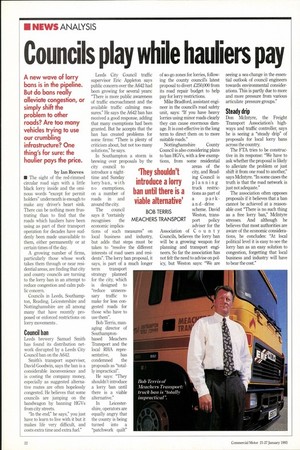Councils play while hauliers pay
Page 24

If you've noticed an error in this article please click here to report it so we can fix it.
A new wave of lorry bans is in the pipeline. But do bans really alleviate congestion, or simply shift the problem to other roads? Are too many vehicles trying to use our crumbling infrastructure? One thing's for sure: the haulier pays the price.
by Ian Reeves • The sight of the red-rimmed circular road sign with a little black lorry inside and the ominous words "except for permit holders" underneath is enough to make any driver's heart sink. There can be nothing more frustrating than to find that the roads which hauliers have been using as part of their transport operation for decades have suddenly been made unavailable to them, either permanently or at certain times of the day.
A growing number of firms, particularly those whose work takes them through or near residential areas, are finding that city and county councils are turning to the lorry ban in an attempt to reduce congestion and calm public concern.
Councils in Leeds, Southampton, Reading, Leicestershire and Nottinghamshire are all among many that have recently proposed or enforced restrictions on lorry movements.
Council ban Leeds brewery Samuel Smith has found its distribution network disrupted by a Leeds City Council ban on the A642.
Smith's transport superviser, David Goodwin, says the ban is a considerable inconvenience and is costing the company money, especially as suggested alternative routes are often hopelessly congested. He believes that some councils are jumping on the bandwagon by banning HGVs from city streets.
"In the end," he says," you just have to learn to live with it but it makes life very difficult, and costs extra time and extra fuel."
Leeds City Council traffic supervisor Eric Appleton says public concern over the A642 had been growing for several years: "There is more public awareness of traffic encroachment and the available traffic calming measures." He says the A642 ban has received a good response, adding that many exemptions had been granted. But he accepts that the ban has created problems for some firms: "There is plenty of criticism about, but not too many solutions," he says.
In Southampton a storm is brewing over proposals by the city council to introduce a nighttime and Sunday lorry ban, with no exemptions, on a number of roads in and around the city.
The council says it "certainly recognises the economic implications of such measures" on local business and industry, but adds that steps must be taken to "resolve the different interests of road users and residents". The lorry ban proposal, it says, is part of a much longer term transport strategy planned for the city, which is designed to "reduce unnecessary traffic to make for less congested roads for those who have to use them".
Bob Terris, managing director of Southamptonbased Meachers Transport and the local RHA representative, has condemned the proposals as "totally impractical".
He says: "They shouldn't introduce a lorry ban until there is a viable alternative."
In Leicestershire, operators are equally angry that the county is being turned into a "patchwork quilt" of no-go zones for lorries, following the county council's latest proposal to divert £250,000 from its road repair budget to help pay for lorry restrictions.
Mike Bradford, assistant engineer in the council's road safety unit, says: "If you have heavy lorries using minor roads clearly they can cause enormous damage. It is cost-effective in the long term to direct them on to more suitable roads."
Nottinghamshire County Council is also considering plans to ban HGVs, with a few exemptions, from some residential areas of the city, and Reading Council is planning truck restrictions as part of a parka n d - drive scheme. David Weston, transport policy adviser for the Association of Count y Councils, believes the lorry ban will be a growing weapon for planning and transport engineers. So far the association has not felt the need to advise on policy, but Weston says: "We are seeing a sea-change in the essential outlook of council engineers towards environmental considerations. This is partly due to more and more pressure from various articulate pressure groups."
Steady drip Don McIntyre, the Freight Transport Association's highways and traffic controller, says he is seeing a "steady drip" of proposals for local lorry bans across the country.
The FTA tries to be constructive in its response: "We have to ask whether the proposal is likely to alleviate the problem or just shift it from one road to another," says McIntyre. "In some cases the truth is that the road network is just not adequate."
The association often opposes proposals if it believes that a ban cannot be achieved at a reasonable cost "There is no such thing as a free lorry ban," McIntyre stresses. And although he believes that most authorities are aware of the economic considerations, he concludes: "At local political level it is easy to see the lorry ban as an easy solution to congestion, forgetting that local business and industry will have to bear the cost."












































































